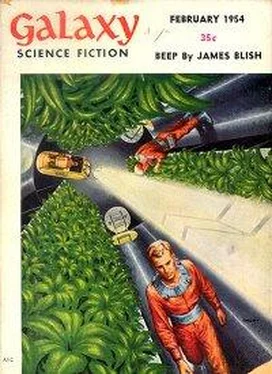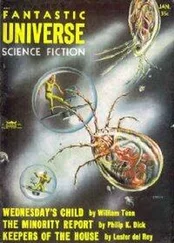William Tenn - Project Hush
Здесь есть возможность читать онлайн «William Tenn - Project Hush» весь текст электронной книги совершенно бесплатно (целиком полную версию без сокращений). В некоторых случаях можно слушать аудио, скачать через торрент в формате fb2 и присутствует краткое содержание. Год выпуска: 1954, Издательство: Galaxy Publishing Corporation, Жанр: Фантастика и фэнтези, на английском языке. Описание произведения, (предисловие) а так же отзывы посетителей доступны на портале библиотеки ЛибКат.
- Название:Project Hush
- Автор:
- Издательство:Galaxy Publishing Corporation
- Жанр:
- Год:1954
- ISBN:нет данных
- Рейтинг книги:5 / 5. Голосов: 1
-
Избранное:Добавить в избранное
- Отзывы:
-
Ваша оценка:
- 100
- 1
- 2
- 3
- 4
- 5
Project Hush: краткое содержание, описание и аннотация
Предлагаем к чтению аннотацию, описание, краткое содержание или предисловие (зависит от того, что написал сам автор книги «Project Hush»). Если вы не нашли необходимую информацию о книге — напишите в комментариях, мы постараемся отыскать её.
Project Hush — читать онлайн бесплатно полную книгу (весь текст) целиком
Ниже представлен текст книги, разбитый по страницам. Система сохранения места последней прочитанной страницы, позволяет с удобством читать онлайн бесплатно книгу «Project Hush», без необходимости каждый раз заново искать на чём Вы остановились. Поставьте закладку, и сможете в любой момент перейти на страницу, на которой закончили чтение.
Интервал:
Закладка:
Project Hush
by William Tenn
I guess I’m just a stickler, a perfectionist, but if you do a thing, I always say, you might as well do it right. Everything satisfied me about the security measures on our assignment except one—the official Army designation.
Project Hush.
I don’t know who thought it up, and I certainly would never ask, but whoever it was, he should have known better. Damn it, when you want a project kept secret, you don’t give it a designation like that! You give it something neutral, some name like the Manhattan and Overlord they used in World War II, which won’t excite anybody’s curiosity.
But we were stuck with Project Hush and we had to take extra measures to ensure secrecy. A couple of times a week, everyone on the project had to report to Psycho for DD&HA—dream detailing and hypnoanalysis—instead of the usual monthly visit. Naturally, the commanding general of the heavily fortified research post to which we were attached could not ask what we were doing, under penalty of court-martial, but he had to be given further instructions to shut off his imagination like a faucet every time he heard an explosion. Some idiot in Washington was actually going to list Project Hush in the military budget by name! It took fast action, I can tell you, to have it entered under Miscellaneous “X” Research.
Well, we’d covered the unforgivable blunder, though not easily, and now we could get down to the real business of the project. You know, of course, about the A-bomb, H-bomb, and C-bomb because information that they existed had been declassified. You don’t know about the other weapons being devised—and neither did we, reasonably enough, since they weren’t our business—but we had been given properly guarded notification that they were in the works. Project Hush was set up to counter the new weapons.
Our goal was not just to reach the Moon. We had done that on June 24, 1967 with an unmanned ship that carried instruments to report back data on soil, temperature, cosmic rays and so on. Unfortunately, it was put out of commission by a rock slide.
An unmanned rocket would be useless against the new weapons. We had to get to the Moon before any other country did and set up a permanent station—an armed one—and do it without anybody else knowing about it.
I guess you see now why we on (damn the name!) Project Hush were so concerned about security. But we felt pretty sure, before we took off, that we had plugged every possible leak.
We had, all right. Nobody even knew we had raised ship.
We landed at the northern tip of Mare Nubium, just off Regiomontanus, and, after planting a flag with appropriate throat-catching ceremony, had swung into the realities of the tasks we had practiced on so many dry runs back on Earth.
Major Monroe Gridley prepared the big rocket, with its tiny cubicle of living space, for the return journey to Earth which he alone would make.
Lieutenant-colonel Thomas Hawthorne painstakingly examined our provisions and portable quarters for any damage that might have been incurred in landing.
And I, Colonel Benjamin Rice, first commanding officer of Army Base No. 1 on the Moon, dragged crate after enormous crate out of the ship on my aching academic back and piled them in the spot two hundred feet away where the plastic dome would be built.
We all finished at just about the same time, as per schedule, and went into Phase Two.
Monroe and I started work on building the dome. It was a simple prefab affair, but big enough to require an awful lot of assembling. Then, after it was built, we faced the real problem—getting all the complex internal machinery in place and in operating order.
Meanwhile, Tom Hawthorne took his plump self off in the single-seater rocket which, up to then, had doubled as a life-boat.
The schedule called for him to make a rough three-hour scouting survey in an ever-widening spiral from our dome. This had been regarded as a probable waste of time, rocket fuel, and manpower—but a necessary precaution. He was supposed to watch for such things as bug-eyed monsters out for a stroll on the Lunar landscape. Basically, however, Tom’s survey was intended to supply extra geological and astronomical meat for the report which Monroe was to carry back to Army Headquarters on Earth.
Tom was back in forty minutes. His round face, inside its transparent bubble helmet, was fish-belly white. And so were ours, once he told us what he’d seen.
He had seen another dome.
“The other side of Mare Nubium—in the Riphaen Mountains,” he babbled excitedly. “It’s a little bigger than ours, and it’s a little flatter on top. And it’s not translucent, either, with splotches of different colors here and there—it’s a dull, dark, heavy gray. But that’s all there is to see.”
“No markings on the dome?” I asked worriedly. “No signs of anyone—or anything—around it?”
“Neither, Colonel.” I noticed he was calling me by my rank for the first time since the trip started, which meant he was saying in effect, “Man, have you got a decision to make!”
“Hey, Tom,” Monroe put in. “Couldn’t be just a regularly shaped bump in the ground, could it?”
“I’m a geologist, Monroe. I can distinguish artificial from natural topography. Besides—” he looked up—“I just remembered something I left out. There’s a brand-new tiny crater near the dome—the kind usually left by a rocket exhaust.”
“Rocket exhaust?’ I seized on that. “Rockets, eh?”
Tom grinned a little sympathetically. “Spaceship exhaust, I should have said. You can’t tell from the crater what kind of propulsive device these characters are using. It’s not the same kind of crater our rear-jets leave, if that helps any.”
Of course it didn’t. So we went into our ship and had a council of war. And I do mean war. Both Tom and Monroe were calling me Colonel in every other sentence. I used their first names every chance I got.
Still, no one but me could reach a decision. About what to do, I mean.
“Look,” I said at last, “here are the possibilities. They know we are here—either from watching us land a couple of hours ago or from observing Tom’s scoutship—or they do not know we are here. They are either humans from Earth—in which case they are in all probability enemy nationals—or they are alien creatures from another planet—in which case they may be friends, enemies or what-have-you. I think common sense and standard military procedure demand that we consider them hostile until we have evidence to the contrary. Meanwhile, we proceed with extreme caution, so as not to precipitate an interplanetary war with potentially friendly Martians, or whatever they are.
“All right. It’s vitally important that Army Headquarters be informed of this immediately. But since Moon-to-Earth radio is still on the drawing boards, the only way we can get through is to send Monroe back with the ship. If we do, we run the risk of having our garrison force, Tom and me, captured while he’s making the return trip. In that case, their side winds up in possession of important information concerning our personnel and equipment, while our side has only the bare knowledge that somebody or something else has a base on the Moon. So our primary need is more information.
“Therefore, I suggest that I sit in the dome on one end of a telephone hookup with Tom, who will sit in the ship, his hand over the firing button, ready to blast off for Earth the moment he gets the order from me. Monroe will take the single-seater down to the Riphad Mountains, landing as close to the other dome as he thinks safe. He will then proceed the rest of the way on foot, doing the best scouting job he can in a spacesuit.
“He will not use his radio, except for agreed-upon nonsense syllables to designate landing the single-seater, coming upon the dome by foot, and warning me to tell Tom to take off. If he’s captured, remembering that the first purpose of a scout is acquiring and transmitting knowledge of the enemy, he will snap his suit radio on full volume and pass on as much data as time and the enemy’s reflexes permit. How does that sound to you?”
Читать дальшеИнтервал:
Закладка:
Похожие книги на «Project Hush»
Представляем Вашему вниманию похожие книги на «Project Hush» списком для выбора. Мы отобрали схожую по названию и смыслу литературу в надежде предоставить читателям больше вариантов отыскать новые, интересные, ещё непрочитанные произведения.
Обсуждение, отзывы о книге «Project Hush» и просто собственные мнения читателей. Оставьте ваши комментарии, напишите, что Вы думаете о произведении, его смысле или главных героях. Укажите что конкретно понравилось, а что нет, и почему Вы так считаете.












